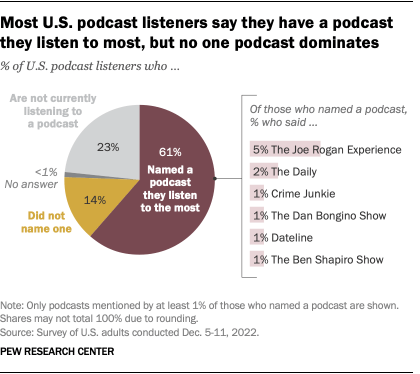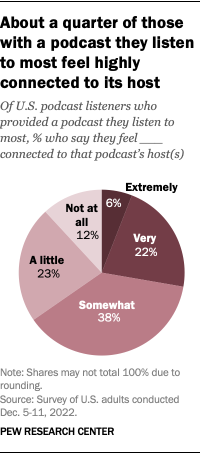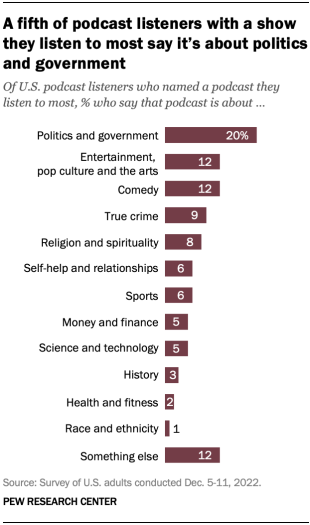Podcasts have become a big part of many Americans’ normal routine – and their news diet. But a new Pew Research Center survey reveals that podcast listening is highly fragmented, and no one show dominates.
Pew Research Center conducted this analysis to explore U.S. adults’ views of and experiences with podcasts as a part of the news and information landscape.
To examine the ways Americans get news and information in a digital age, the Center surveyed 5,132 U.S. adults from Dec. 5 to 11, 2022. Everyone who completed the survey is a member of the Center’s American Trends Panel (ATP), an online survey panel that is recruited through national, random sampling of residential addresses. This way nearly all U.S. adults have a chance of selection. The survey is weighted to be representative of the U.S. adult population by gender, race, ethnicity, partisan affiliation, education and other categories. Read more about the ATP’s methodology.
In the questionnaire, U.S. adults who said they are currently listening to at least one podcast were asked in an open-ended question to write in the name of the podcast that they listen to most. If respondents answered with the names of more than one podcast, only the first one was coded. In total, 1,563 open-end responses were coded.
Here are the questions used for this report, along with responses, and its methodology.
Pew Research Center is a subsidiary of The Pew Charitable Trusts, its primary funder. This is the latest report in Pew Research Center’s ongoing investigation of the state of news, information and journalism in the digital age, a research program funded by The Pew Charitable Trusts, with generous support from the John S. and James L. Knight Foundation.

The survey asked adult podcast listeners (those who said they listened to a podcast in the past 12 months) in the United States to name the podcast they listen to most. Overall, 61% of listeners volunteered the name of a podcast, but there was relatively little common ground in these answers.
Only six podcasts were mentioned by at least 1% of those who volunteered an answer: The Joe Rogan Experience (named by 5% of those who gave a response), The New York Times’ The Daily (2%), Crime Junkie (1%), The Dan Bongino Show (1%), NBC’s Dateline (1%) and The Ben Shapiro Show (1%). Looking at all U.S. podcast listeners, as opposed to just those who gave a podcast, no single podcast was named by more than 3% of listeners.
After asking podcast listeners for the single podcast they listen to most, the survey also asked listeners about their sense of connection to that podcast’s host or hosts.

About two-thirds (65%) of respondents who named a podcast they listen to most said they feel at least somewhat connected to the host of the podcast they named, including 27% who feel extremely or very connected.
And more frequent listening lines up with a greater sense of connection: Americans who listen to podcasts at least multiple times a week are more likely than less frequent listeners to say they feel extremely or very connected to the host of the podcast they listen to most.
The survey also asked the same group of U.S. adults about the topic of their most-listened-to podcast. Among the most popular topics were politics and government (20%); entertainment, pop culture and the arts (12%); and comedy (12%).

Across a variety of topic areas, news is a regular theme in podcasts. Among those who volunteered the name of a podcast that they listen to most, two-thirds say news has ever been discussed on that podcast.
However, respondents are more likely to say they have heard news discussed if their most-listened-to podcast is about politics and government. Nearly all respondents who say the podcast they listen to most is focused on politics and government (95%) say they have heard news discussed there. The same is true for smaller – but still sizable – shares of those who say the podcast they listen to most is about entertainment (70%), comedy (68%) or true crime (55%).
Note: Here are the questions used for this report, along with responses, and its methodology.





